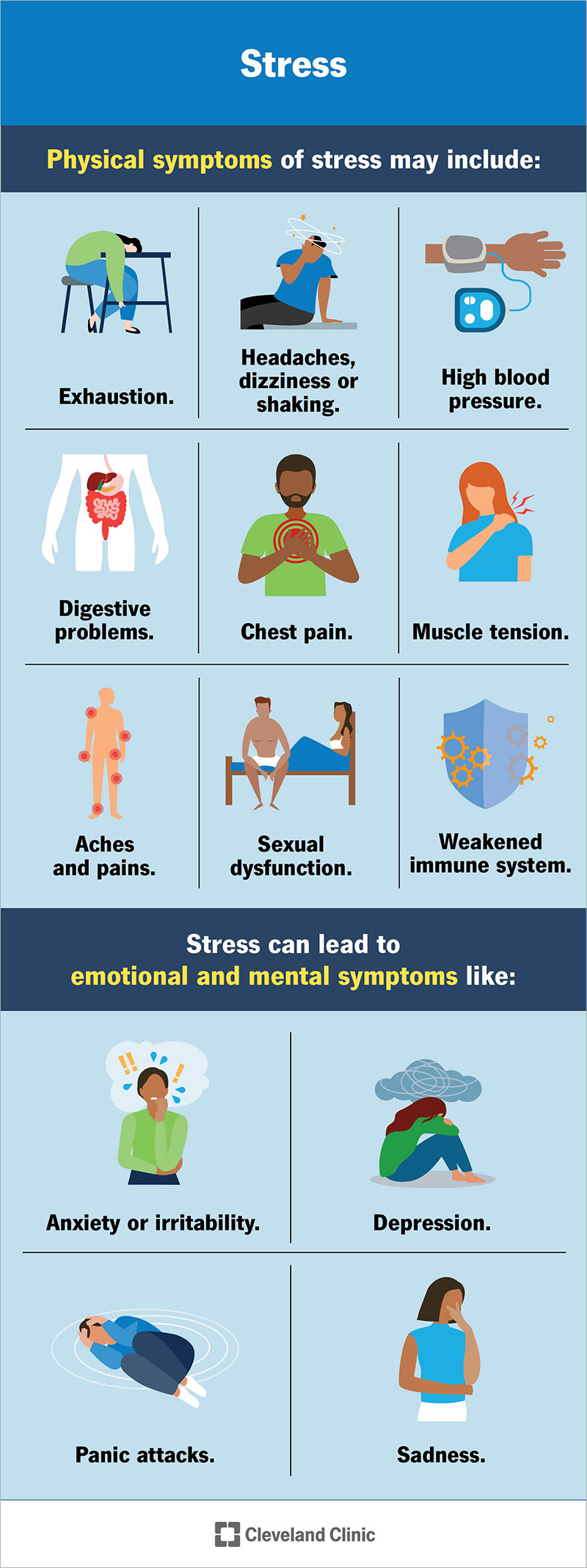How does stress affect the body?
Your body’s autonomic nervous system controls your heart rate, breathing, vision changes and more. Its built-in stress response — the “fight-or-flight response” — helps your body face stressful situations.
When you have long-term (chronic) stress, continued activation of the stress response causes wear and tear on your body. You may develop stress symptoms that are physical, psychological or behavioral.
Physical symptoms
Physical symptoms of stress may include:
- Aches and pains.
- Chest pain or a feeling like your heart is racing.
- Exhaustion or trouble sleeping.
- Headaches, dizziness or shaking.
- High blood pressure (hypertension).
- Muscle tension or jaw clenching.
- Stomach or digestive problems.
- Trouble having sex.
- Weakened immune system.
Psychological symptoms
Stress can lead to emotional and mental (psychological) symptoms, like:
Behavioral symptoms
Often, people with chronic stress try different things to cope. And some of those things are habit-forming and can have an impact on your health. These may include:
Stress rash
Stress rashes often appear as pink or discolored, raised bumps called hives. Hives are welts that can develop and swell on the surface of your skin. They can itch, burn and even hurt. Hives are usually an allergic reaction to something, like certain kinds of foods, fabrics or chemicals. But sometimes, stress can trigger an outbreak.
Stress rashes are more common in women and people assigned female at birth (AFAB) than men and people assigned male at birth (AMAB), and they affect people in their 20s, 30s and 40s most often. But they can also affect anyone. Like other kinds of hives, you can try treating them with an antihistamine. But it’s also important to manage your stress.
What causes stress?
Stress is how your body reacts to a change or challenge, and many different things can lead to it. Stressors can also be positive or negative. For instance, getting a new job or losing a job can both cause stress. Other causes of stress include:
- An illness or death of a loved one.
- Marriage, separation or divorce.
- Financial issues.
- Moving to a new house.
- Going on vacation.
- Having a baby.
- Retiring.
Stress can also be acute, meaning short term. Causes of acute stress may include everyday stressors, like:
- Studying for a big test.
- Getting ready for a work presentation.
- Having an argument with a friend or loved one.
- Needing to get a lot completed in a short amount of time.
- Experiencing many small problems all at once, like getting in a traffic jam, spilling coffee all over yourself and running late.
What are the complications of stress?
Chronic stress can lead to many long-term health issues affecting your:
- Immune system (like arthritis, fibromyalgia and psoriasis).
- Digestive system (like weight gain or loss, ulcers and irritable bowel syndrome).
- Cardiovascular system (like high blood pressure, increased heart rate and heart palpitations).
- Reproductive system (like infections, polycystic ovarian syndrome and infertility).
Stress can also put you at a higher risk of developing a mental health condition, like depression or anxiety. If you’re feeling severely stressed and/or thinking about hurting yourself, call or text 988 to reach the 988 Suicide & Crisis Lifeline.
How is stress diagnosed?
Stress is subjective — not measurable with tests. Only the person experiencing it can determine whether it’s present and how severe it feels. A healthcare provider may use questionnaires to understand your stress and how it affects your life.
If you have chronic stress, your healthcare provider can evaluate symptoms that result from stress. For example, they can diagnose and treat high blood pressure.
